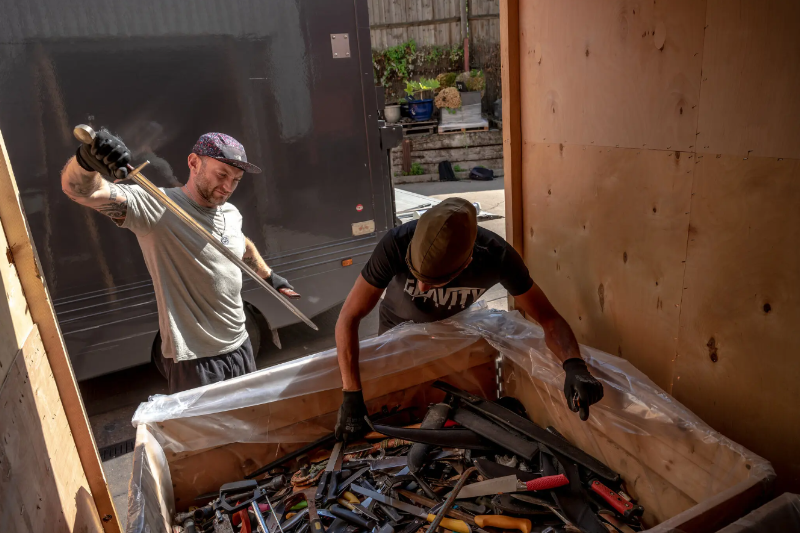
uk proposes new law holding tech executives accountable for online knife sales amid rising crime concerns
The UK government has proposed a new concept whereby directors of digital corporations would be personally responsible for any illegal knife sales encouraged on their platforms. This proposed control directly answers the alarming increase in knife-related crimes all throughout the United Kingdom. Should the legislation be passed, law enforcement would be able to promptly alert internet businesses asking the removal of content supporting illicit weapon sales with possible compliance deadlines as little as two days. Executives who disobey these instructions may be liable to severe financial penalties, therefore altering the regulatory environment by placing personal accountability on business leaders.
A Turning Point towards Executive Social Media Responsibility
The proposal is significant since it challenges long-standing policies that often maintain social media networks free from legal responsibility for user-generated content. While current UK legislation largely relies on users who upload content to take responsibility, this new law targets the decision-makers in digital corporations, therefore generating direct personal consequences. Aiming to give public safety a priority by addressing the availability of deadly weapons in online markets, the recommended actions deviate from earlier online restrictions.
Though it is now under review, the policy underlines the will of the UK government to implement a strong strategy to reduce crime rates. Though below pre-pandemic levels, knife crimes in England and Wales have lately exhibited a concerning rise. Statistics showing a concerning rising trend show a 4% increase in knife-related offenses and a 13% increase in robberies involving blades for the year ending in March 2024. Furthermore, the 12 months before June 2024 had 225 reported homicides employing knives, which underlines the urgency of addressing weapon availability.
Prominent support for action against sales of internet weapons
Particularly those affected by knife crime, advocacy groups and victim’s families have actively backed the proposed regulations. The legislative effort now finds great resonance in the personal story of Pooja Kanda, whose 16-year-old son Ronan was killed in 2022 with a weapon acquired online. Before he took office, Keir Starmer committed to visit families like Kanda’s to handle these tragedies, therefore proving his will to create online settings safer. Emphasizing her relief at the recommended ban on weapons like the “ninja blade,” which was used in her son’s death, Kanda has praised the government for at last delivering on its promises.
UK Home Secretary Yvette Cooper, who defines the rise in knife crime over the previous 10 years as a calamity “devastating families and communities,” also shows great support for the new laws. Cooper has set a strong goal to decrease knife crime by half within the next ten years, asserting that the administration is willing to implement extreme policies to attain this aim. This stance captures the growing consensus among UK authorities on the need of stronger regulation of online channels in order to curb the dissemination of weapon-related violence.
The government’s recommendations line up with increased physical and online crackdown on deadly weaponry. Among the illegal weapons the UK listed “zombie knives” and machetes this September. These devices, which have blades more than eight inches long with serrated edges or numerous sharp points, have come to symbolize the government’s attempt to limit the availability of deadly objects usually related with violent crime.
Given approximately thirty percent of all crimes reported by London’s Metropolitan Police Service, the knife crime epidemic is particularly severe in large cities. Covering cities like Birmingham and Coventry, the West Midlands Police also observe a significant incidence of these crimes, making up roughly 10% of all knife-related crimes in the country. The government aims to reduce the availability of deadly weapons for people motivated by ill intents by means of these extra rules.
Keep Reading
Governments Press Social Media Enterprises: An International Trend
The UK’s proposal follows a global pattern whereby governments are progressively blaming social media companies for user-generated content. Earlier this year, Pavel Durov, the developer of the Telegram chat program, was arrested in France under suspicion of platform involvement in criminal activity. Australia recently saw Prime Minister Anthony Albanese propose a social media ban for users under the age of sixteen; in Brazil, the social networking platform X was momentarily suspended for failing to remove certain material.
Many European lawmakers believe companies like Meta, Google, TikHub, and X should take greater ownership for monitoring and regulating content on their networks. Though notably in the United States where leaders like President-elect Donald J. Trump and tech billionaire Elon Musk, owner of X, argue that such rules could limit free expression, especially for conservative points of view, this drive toward more rigid control is not without controversy. Content moderation guidelines, they argue, could accidentally support one point of view, therefore limiting free expression for another.
Political and cultural dimensions of knife crime in the United Kingdom
Especially when it impacts some areas and younger populations, the rise of knife crime in the UK also begs more general political and cultural issues. Experts say that the influence of social media in raising violent lifestyles has been mostly responsible for the increase in weapon-related occurrences among young people. Community leaders and mental health professionals have voiced concerns on how easily accessible internet information and peer influence could normalize violence, therefore stressing the need of stricter content standards to prevent these influences.
In the UK particularly in poor areas, social media channels have been blamed for unwittingly supporting violent trends by broadcasting content glamorizing knife crime. The government is signaling to social media companies with the new suggestions that public safety must be given first priority even if it involves changing the way platforms work, therefore addressing the double issue of controlling harmful online material.
Directions toward New Laws and Their Impact on Executives in Technology
Though they are still under review, the concepts have generated a lively public debate and most likely will progress in the legislative process. Should the law pass, it would establish a powerful precedent in Europe attributing personal responsibility for social media executives for the content uploaded on their services. This legislative action not only fights crime but also provides a model for how the digital domain may be governed more sensibly for lawmakers in the United Kingdom.
With knife crime first on public safety concerns, the UK’s proposed regulations mark a major step toward redefining the purpose of digital platforms in user protection. Making executives liable helps the government to clearly indicate that the moment has come for social media companies to engage more strongly in reducing the hazards provided by uncontrolled internet markets. This action marks a new era of corporate responsibility and might not only alter the scene of tech control in the UK but also serve as a viable road map for other nations facing similar problems.









